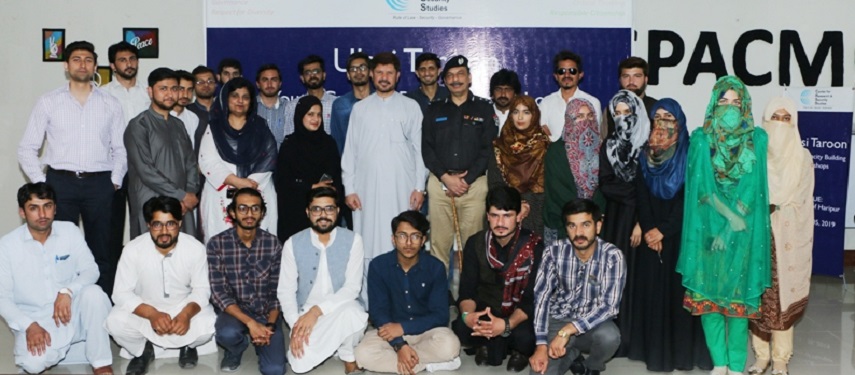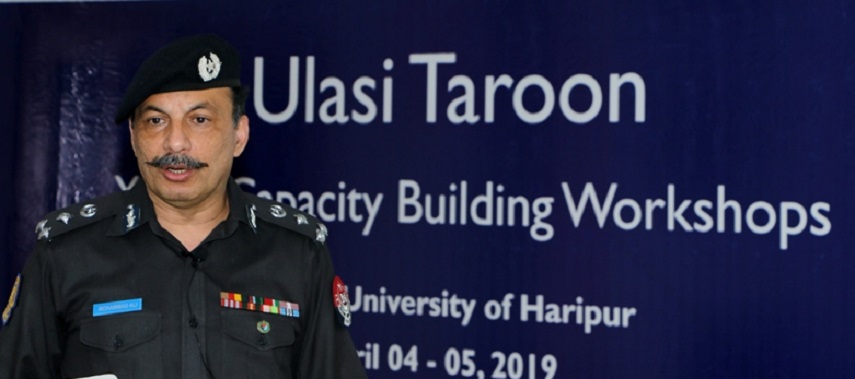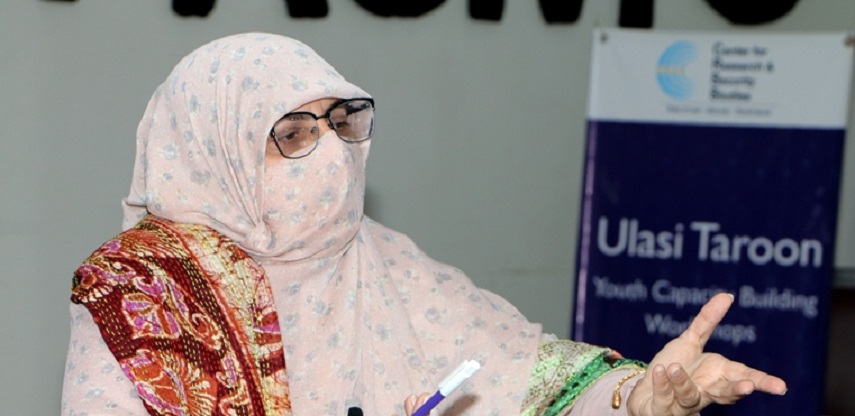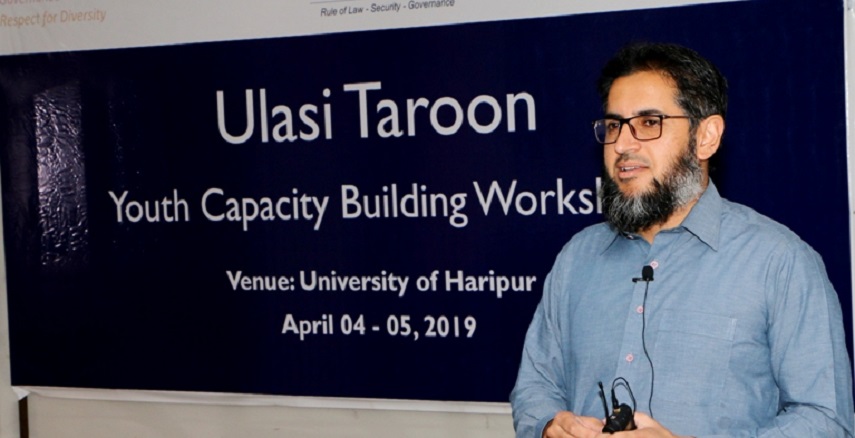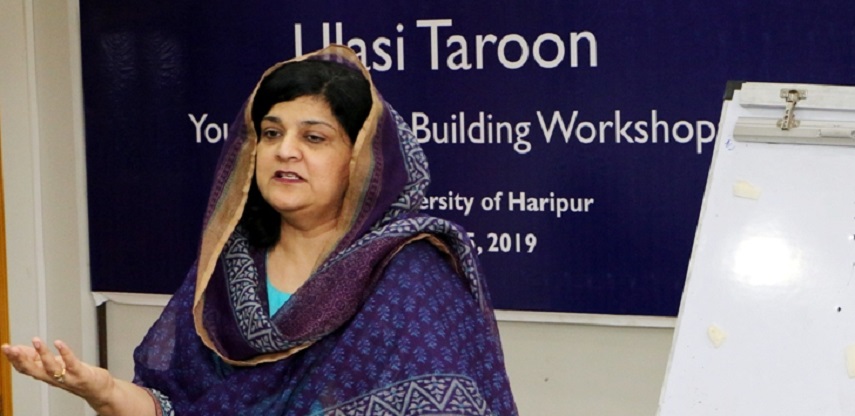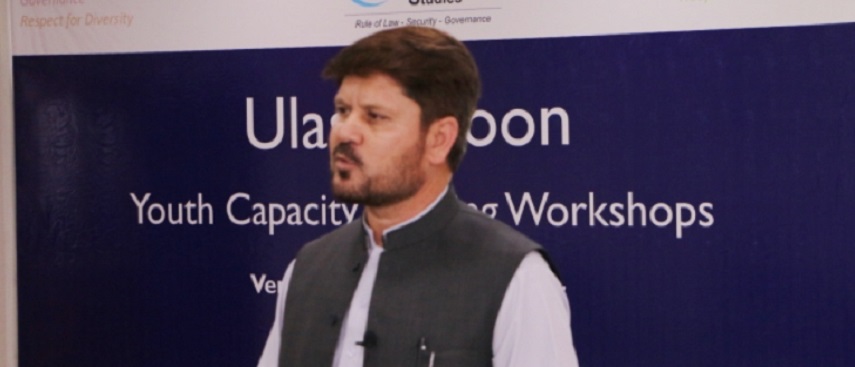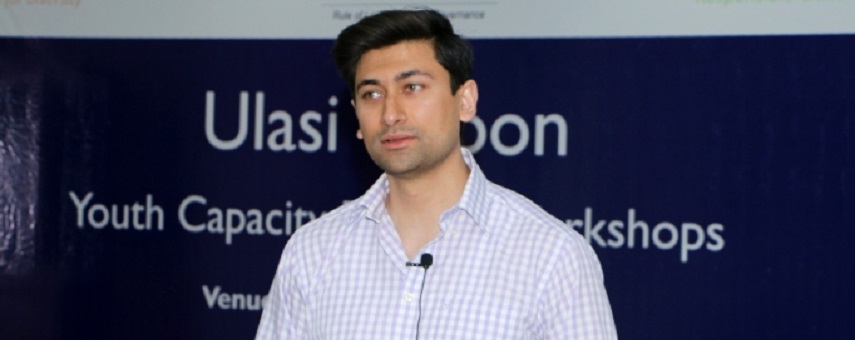The ultimate objective of rule of law is peace; upholding the fundamental human rights – enshrined in the constitution vide articles 8-28, where it has to be considerate of the ideals of equality and equity. The selective application of law is always detrimental to social cohesion.
These were the remarks made by Mr. Mohammad Ali Babakhail, Deputy Inspector General of Police (DIG) Hazara, during the seventeenth round of Ulasi Taroon, Youth Capacity Building Workshops organized by the Center for Research and Security Studies (CRSS) in collaboration with the University of Haripur.
The DIG Hazara noted that rule of law requires volunteerism – characterized by responsible citizenship – on the part of each and every member of the society. The best the citizens can do to uphold rule of law is to adhere to law. An egalitarian society is the one where everyone is subject to law, no matter how powerful. The countries that provide opportunities for participation in the democratic processes and environments more conducive to social inclusion are more likely to develop. Rule of law is directly related to the democratic values of peaceful coexistence.
Social media has a huge potential to promote adherence to rule of law and the virtues of responsible citizenship. The purpose of police is to maintain law and order and uphold rule of law in the society. The Khyber Pakhtunkhwa police is ever more accountable and a role model for other provinces to reform and incorporate the policing needs of the communities and ameliorate the public-police trust deficit. The public must also recognize the tremendous sacrifices laid by the police – for peace and rule of law – going above and beyond the call of duty.
Ms. Amna Sardar, former member of provincial assembly, Khyber Pakhtunkhwa, said that one of the most significant responsibilities of elected representatives is to fulfil their mandate for effective representation by doing legislation critical to the social peace and cohesion, and public welfare. They should also work to ensure good governance; exercising effective oversight over the working of relevant ministers and departments of the government. The role of public representatives is also very critical to promote indiscriminate accountability including self-accountability.
The public participation in the decision making processes is key to inclusive democracy and lend greater transparency and credibility to the governance. Responsible citizenship is of utmost importance for accountable governance where the citizens should proactively highlight and report the crimes in and other menaces of the society.
Dr. Shiraz Khan, Registrar, The University of Haripur, noted that the virtues of tolerance, acceptance and equality are the fundamentally essential prerequisites for success. The successful and bright future comes through shared goals and a selfless vision for the development and inclusion of the community at large. Responsible citizenship demands considering national interest to be paramount than the personal interest, that is only how we can have a sustainable peace and integration.
“The CRSS Ulasi Taroon workshops have a huge potential to prepare a cadre of future leaders who can positively impact their personal and professional spheres as well as the national socio-political life”, he concluded while appreciating the youth capacity building workshops organized by CRSS.
Mrs. Shagufta Khalique, educationist, underscored the importance of educating public on the rights and responsibilities anchored in their constitution as well as the international commitments like UDHR. The role of youth in promoting these ideals of equality and tolerance is direly needed. Once the diversity and differences are accepted in a society, the ultimate result is peace. Democracy is also an attitude that needs to be inculcated among youth with practical examples. We must understand that dialogue is the key to resolve the disputes and differences rather than force or coercive means.
Mr. Shams Momand, Project Manager, CRSS spoke about the role of media including broadcast, print and social media to counter radicalization and disseminate the positive messages and tolerance perspectives. It has tremendous outreach; key to cultivate the public in the cohesive values. The youth should positively use this platform to spread the messages of peace and harmony.
Mr. Malik Mustafa, Manager Programs, CRSS underscored that the key to social cohesion lies in abiding by the core constitutional values of peace, respect and coexistence enshrined in the constitution. The gratitude and optimism are the virtues that can not only nurture happiness but can also change the way the youth can pursue their visions and achieve success.
Ulasi Taroon is a counter radicalization initiative of CRSS that aims to address the radicalization challenges, extremist ideologies and foster social cohesion through a discourse anchored in the core constitutional values which are fundamentally essential prerequisites for social peace and harmony. The endeavor aims to cultivate and sensitize the youth – in the universities across KP – in the core values in the Pakistani constitution and our social contract. It’s an attempt to highlight the criticality of abiding by these ideals – such as adherence to rule of law, primacy and sanctity of constitution, equal citizenry, responsible citizenship, respect for fundamental human rights, tolerance for diversity and different opinions, inclusive democracy and good governance – as a measure of fostering social cohesion and peaceful co-existence.

